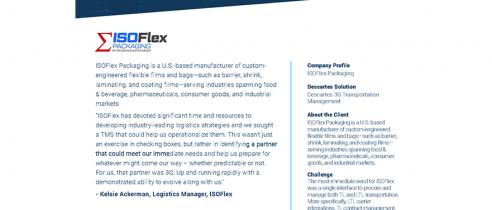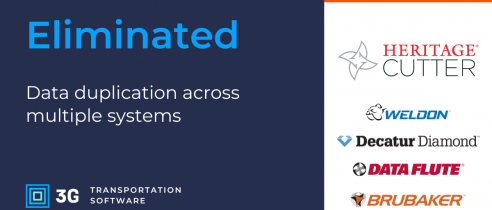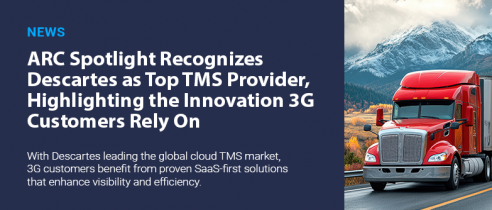Blog
How to Buy a Superior Cloud TMS On a Tight Budget

Are you in the market for a new cloud-based transportation management system (TMS), but have budget restraints or limitations?
In this article, we’ll show you how to buy a superior cloud TMS on a restricted budget. We’ll also provide tips for getting the most out of your investment. Whether you’re just starting out or you’re looking for an affordable upgrade, read on for the best advice.
What is a Cloud TMS?
A cloud TMS is a system that is based on cloud-based software development and therefore does not need to be installed solely on-premise. TMS solutions that are in the cloud offer some advantages over on-premise systems.
Flexibility is not something you typically find with traditional TMS solutions. With a cloud-based system, everyone on your team can access the system with the proper permissions and credentials from anywhere in the world or just from approved locations.
Advantages of a Cloud TMS
Because a cloud-based transportation management system (TMS) can be accessed from any location with an Internet connection, your data is always retrievable. Information is typically stored on servers with zero downtime and redundancy protocols built in to be “always-on” and always available.
Today, cloud TMS platforms are most prevalent in the market and this trend will likely become the future of TMS delivery.
Among cloud TMS advantages are:
- Easy access for users; from anywhere with the Internet and through different devices.
- Easier customization based on user preferences.
- Real-time information updates so all users have access to the latest data.
- Faster implementation of TMS solutions at lower costs. No additional (server) hardware is needed – opening up new opportunities for smaller businesses, who otherwise could not afford the up-front infrastructure costs.
- Easier and more secure deployments, facilitating scalability.
- Possibility of integrating through API and EDI with other software applications and systems that the client company has (ERP, CRM, SCM, etc). TMS solutions are often associated with a range of tools in supply chain management.
- Data storage capacity; unlimited space to store company data, with the possibility of expanding it if necessary.
- Best value for money; within a cloud-based system, companies only pay for what they use.
- Cloud TMS solutions are also supported by outsourced IT professionals, eliminating the need for a costly on-site team of specialists.
- Cloud TMS platforms offer much more in terms of troubleshooting and general technical support than any traditional TMS can offer.
Assess Your Needs and Find a TMS that Meets Them
Employing a cloud TMS solution can streamline your business decisions, improve efficiency, and help increase customer satisfaction. The more difficult task is finding the right one.
At the highest level, a cloud TMS should help you make better business decisions and save you time and money. But to get the most out of the software, you need to know the most useful features to help your business grow.
Ease of use is often an overlooked feature that gets in the way of productivity and becomes a barrier further down the road.
Maintaining a friendly interface and allowing for easy integration with other critical systems are two key areas a product can separate itself from others. Additionally, you should review the following:
Carrier contract management
Are you trying to keep track of multiple carrier relationships with different contracts? Most companies are. Good TMS solutions will simplify the management of carrier contracts.
When you digitize contracts, everyone on your team can easily compare contracts, services, and costs. This saves research time that can otherwise be used on strategy or planning.
Find a cloud TMS that can:
- Keep track of all your individual terms and carrier agreements in real-time.
- Notify you when a contract is pending renewal and include any corresponding information in the new agreement.
- Show services provided and total costs, including any additional charges, so you can easily select the lowest cost carrier.
- Help set prices. A cloud TMS can calculate the exact cost of delivery, so you know how much to charge your customer.
Risk management
If you are in the business of shipping hazardous materials, a cloud TMS offers great advantages. Government regulators will not hesitate to fine you for shipping improperly prepared hazardous materials.
To ensure you are always up to date on policies, regulations and documentation, choose a cloud TMS that will manage your hazmat-specific paperwork, including proper documentation and labeling.
Cloud TMS solutions can help you avoid the risks of international shipping by automating the audit process, generating reports, and ensuring due diligence on the country’s regulatory program or cross-border customs requirements.
International logistics functionality
If you currently work globally, or have plans for international expansion, a TMS can make international shipping much easier.
Look for these cloud TMS features:
- Support for several languages
- Help in the selection of air or sea carriers
- Supports foreign currencies
- Manages commercial invoices, SEDs, and other shipping documents required for international deliveries
- Calculates value-added taxes, cross-border fees, and freight shipping charges
A good cloud TMS keeps up with changing trade agreements and embargoes. The platform may perform system checks, assign export control classification numbers, and complete other functions to assist with business management across the world.
By performing embargoed country verification and restricted party screening, a cloud TMS can help protect you from inadvertent violations of export control regulations.
Item visibility
You’ll have complete visibility down to the item level and be able to comprehensively track shipment status information from pickup to delivery. The data you receive here can also be used to provide advanced analysis to help enhance your strategies and planning.
Your cloud TMS must offer:
- Automatic collection
- Integration via EDI with an operator
- Automatic notifications
- Exception alerts
- Cross device functionality
Visibility will make your customers happy, reduce cycle times, and help manage your logistics costs.
Parcel shipping support
Industry trends against stocking large inventories have led to a demand for smaller, more frequent shipments. If this is an issue for your business, choose a cloud TMS that handles parcel sorting and routing, as well as traditional and smaller shipments.
The importance of customer references
It is essential to evaluate the number of customer references belonging to a transport management solution before choosing. A proven track record for success and being able to provide value that is outside the box is a critical factor in helping a company succeed with any software.
You should not begin your search for TMS software without checking how your peers view a product and how the system helped solve their challenges. You’ll find many transparent views on how a system performed and will be able to make a more informed decision based on your needs.
Think long-term
Another important point to consider is the range of TMS functionality in any system. It’s often common to start by looking at only a subset of features, typically those related to the areas that are most immediately attractive to the business (better control over the billing process, optimization of routing and shipping, etc.).
However, it is very useful to look further and think about the long-term capabilities that the solution can offer.
Will the transport management system be able to face the improvement objectives of the company?
Will the cloud TMS be able to grow and scale as the business does?
Will the TMS provide us the data and insights to reduce costs?
When comparing options, it’s always important to look at the long-term solutions they offer to see how they fit into our company’s vision.
Look for agile providers that grow with the company
Cloud TMS solutions should grow with you as your business needs change. Some cloud-based TMS solutions offer a lot of flexibility by starting with basic functionality, which you can then expand by adding advanced modules. This means that you only pay for the features you need and want.
How to Compare TMS Prices and Features
Once you have analyzed the market of TMS providers in the cloud and compared your needs and expectations with those they offer, you must specifically evaluate their prices and characteristics to understand the economic feasibility of hiring the service with a tight or reduced budget.
For this we recommend you create a matrix where you can place the name of the cloud TMS on one side and on the other side its prices and most relevant characteristics that cover your needs.
Here are some areas to focus on:
- Monthly rates, installation costs, and modules by fee rate.
- Validate that the software is modular and scalable.
- Prices by volume of managed cargo.
- Verify the modules they offer are: route planning and dispatch tracking, cost module, carrier module, fleet management, vehicle availability, collection, document management, traceability, delivery management, advanced data, etc.
- Languages and currencies handled.
- Check if there is a demo and/or free version.
- Check for availability of support documentation and educational/training materials.
- Availability of technical support, customer service, and the conditions of use.
Businesses should also look at the value added by the solution rather than the cost. The biggest value added by any cloud TMS software for carriers will be an increase the number of customers, and therefore an increase in your monthly revenue.
When you can see this as a value add, the cloud TMS is more of an investment than a cost. The price of an investment in your business growth is sometimes an easier pill to swallow.
Limit Your Options To Two Or Three Finalists
Once you have validated what your specific needs are and you’ve sourced multiple TMS software that can accommodate those needs, you’ll want to narrow down to a few finalists.
During this stage, it is very helpful to draw a features matrix where you can compare all the features, prices, benefits, strengths, and any another element of interest for your finalists.
By doing this, you’ll be able to score areas where one system is better than another. You’ll also be able to build pros and cons specific to your needs for each.
This approach allows you to view and select the two or three best cloud TMS solutions that best fit your needs and price perspective.
If you still find you need assistance, there are advisory companies and experts in cloud TMS that have the ability to guide companies in their choice of software. This strategy can help companies make better decisions, avoid errors in the selection of the software.
Request Free Product Trials Or Demos From Finalists
After selecting the best two or three TMS providers that offer the best solution for your needs, you’ll want to schedule calls or meetings and ask for demos and/or a free trial related to what your business needs.
A benefit of a cloud TMS solution is that it can be deployed much more easily as a free trial or in a sandbox environment than something that must be loaded onto on-premise servers. Therefore, most cloud TMS vendors will be willing to let you test their solution. If you find that a company doesn’t provide demos or a free trial, that is a valid reason to walk away.
These companies must be able to demonstrate the benefits and capacity of their system as it pertains to your specific operational needs. You’ll be able to see the advantages a solution delivers when a demo is provided specifically related to your requirements.
You want to come out of these demos with a complete vision of each cloud TMS and how they will perform in your market. When handled correctly, you’ll have what you need to make an easier and well-informed decision.
As the saying goes, seeing is believing. A demo can help you make a final decision about your cloud-based TMS.
Cloud TMS: Reliability, Technical Support & Customer Service
Technical support and customer service are terms that tend to receive strong reactions from software users. Incorporating a system backed by strong levels of support is a must.
You know your team will need support at some point. During the process of finding a cloud TMS, it’s nearly impossible to know your exact needs. Here is some guidance on the questions you should ask to evaluate software providers in this area.
- What kind of technical questions does your staff typically receive?
- What types of support do you offer?
- How many levels or tiers of support are available?
- Is your support outsourced or in-house?
- What is the typical response time for a support request?
You need to know that a cloud TMS provider will deliver on its promise of excellent customer and technical support. They should be able to provide you with an SLA that outlines all of this and provide the highest level of visibility into the reliability and efficacy of their support systems.
Here are some additional evaluation tactics & tips:
- Look for a company that does not outsource technical support. Especially in small and medium-sized software companies, on-site technical support staff tend to have close relationships with their team and can fix problems right away.
- Try making calls to the technical and customer service lines. Was your call taken live or sent to voicemail? How much time elapsed before the call is returned? Try a few more times from different numbers.
- Ask the TMS vendor for response and problem resolution times.
- Check technical support hours of operation and supported languages. Will they work for your users?
- Check if the TMS provider charges for so-called “Premium Support” for phone/email/live chat support and what kind of basic support is offered as part of their agreement. Do you have access to a real person on demand or do you just have access to robotic support?
- Find and prefer cloud TMS providers that offer technical support available 24 hours a day, 7 days a week, 365 days a year.
Final Thoughts
There is no guarantee of success when employing any type of software for your organization but following a roadmap others have used successfully is a good start. Due diligence is paramount during the vetting and selection process.
Don’t take a single path of exploration in deciding on a solution. After all, this is your business, your livelihood, and that of your team. The better alignment a cloud TMS has with how your organization works, the easier time you’ll have in growing your business.







